外研版(2019)选择性必修 第一册Unit 5 Revealing nature Using Language课件(共18张)
文档属性
| 名称 | 外研版(2019)选择性必修 第一册Unit 5 Revealing nature Using Language课件(共18张) | 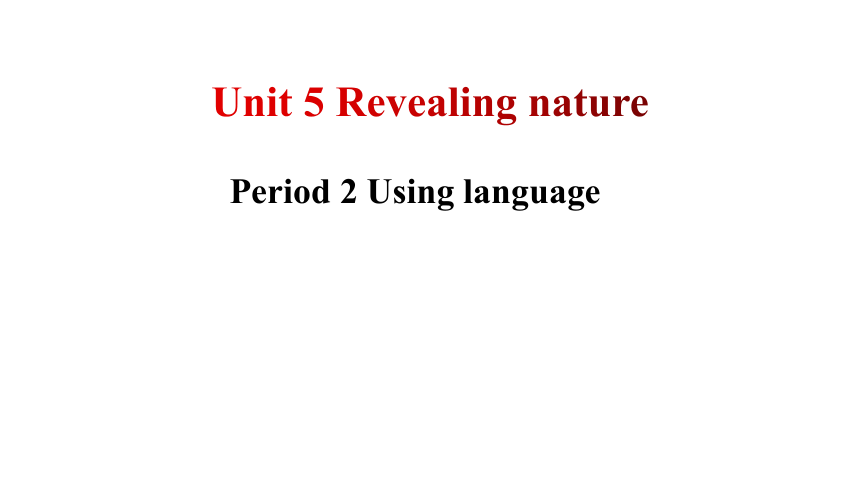 | |
| 格式 | pptx | ||
| 文件大小 | 780.9KB | ||
| 资源类型 | 教案 | ||
| 版本资源 | 外研版(2019) | ||
| 科目 | 英语 | ||
| 更新时间 | 2024-11-16 15:25:23 | ||
图片预览

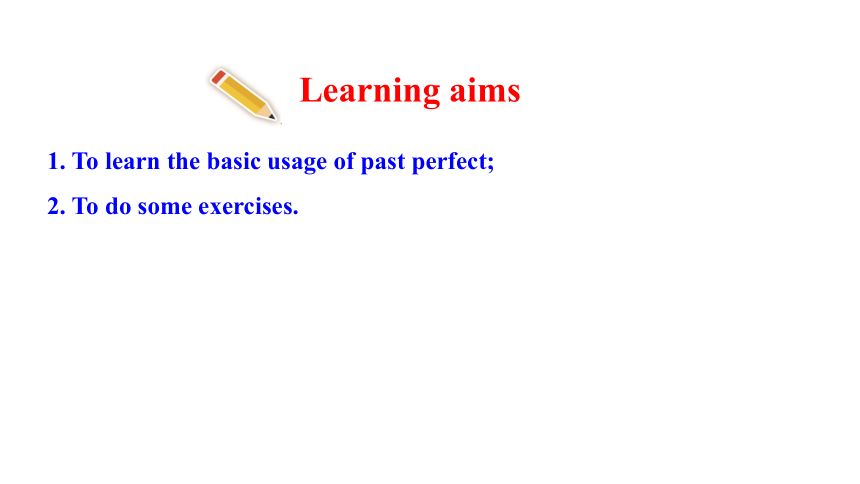
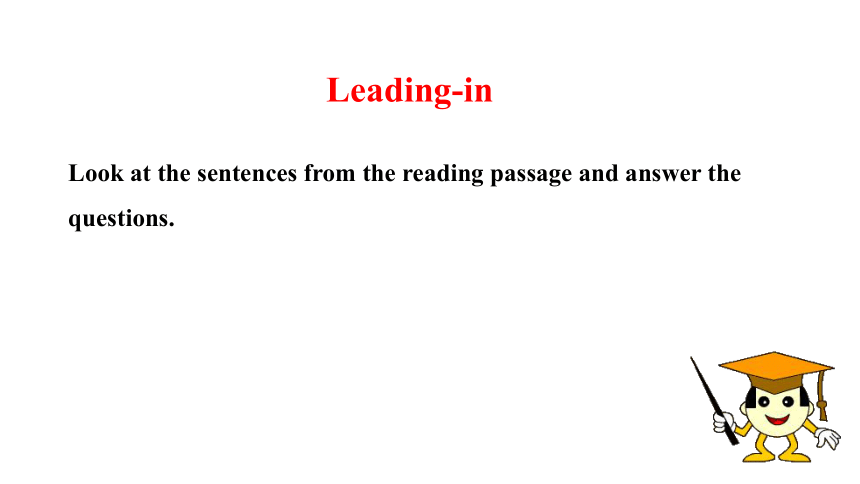
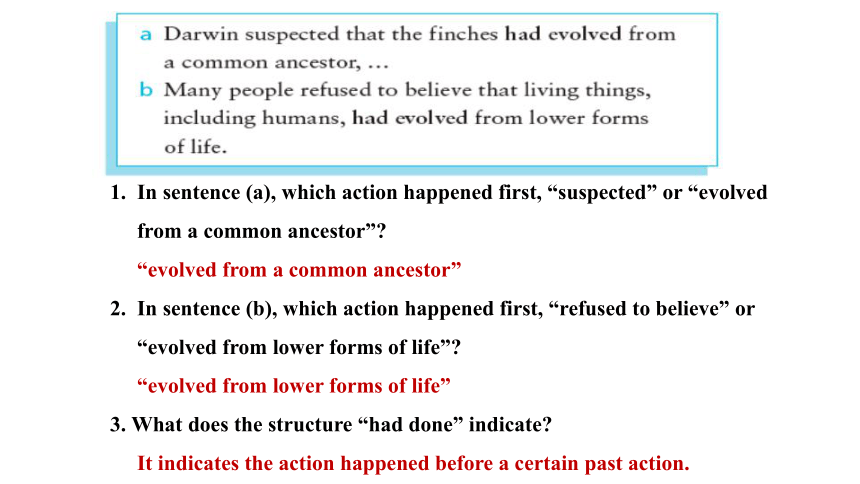
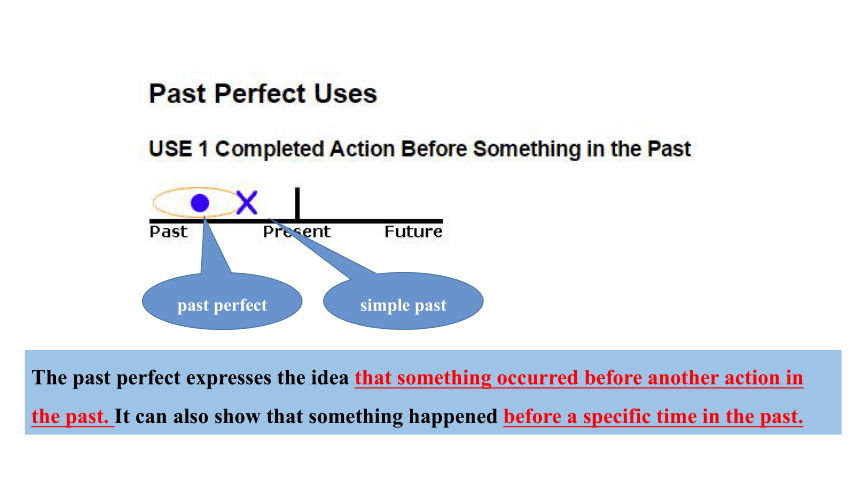
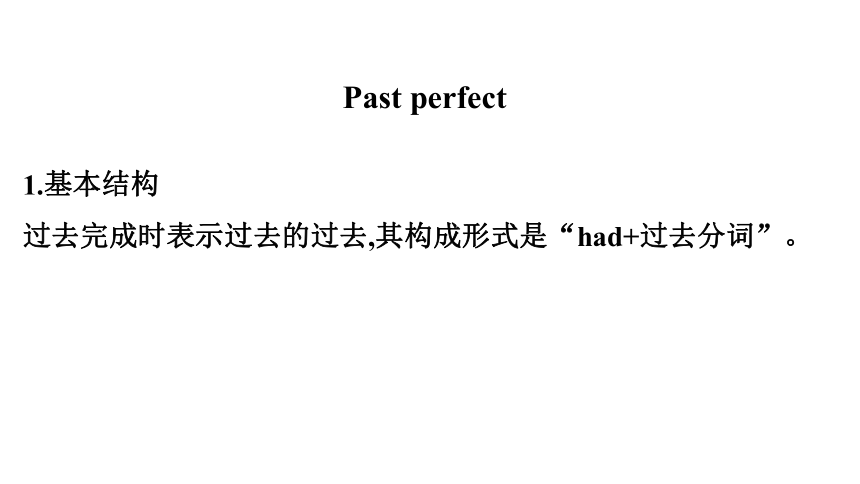
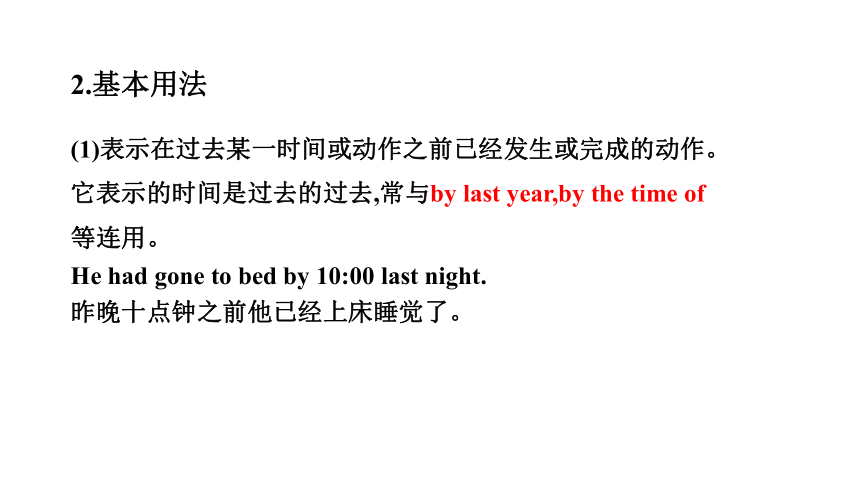
文档简介
(共18张PPT)
Period 2 Using language
Unit 5 Revealing nature
1. To learn the basic usage of past perfect;
2. To do some exercises.
Learning aims
Leading-in
Look at the sentences from the reading passage and answer the questions.
1. In sentence (a), which action happened first, “suspected” or “evolved
from a common ancestor”
“evolved from a common ancestor”
2. In sentence (b), which action happened first, “refused to believe” or
“evolved from lower forms of life”
“evolved from lower forms of life”
3. What does the structure “had done” indicate
It indicates the action happened before a certain past action.
The past perfect expresses the idea that something occurred before another action in the past. It can also show that something happened before a specific time in the past.
past perfect
simple past
Past perfect
1.基本结构
过去完成时表示过去的过去,其构成形式是“had+过去分词”。
2.基本用法
(1)表示在过去某一时间或动作之前已经发生或完成的动作。 它表示的时间是过去的过去,常与by last year,by the time of等连用。
He had gone to bed by 10:00 last night.
昨晚十点钟之前他已经上床睡觉了。
(2)表示从过去某一时间开始一直延续到过去另一时间的动作或状态。常与for (后跟过去的时间段)或since (后跟过去的时间点)等连用。
The train had started when I got to the station.
当我到达车站时火车已经开走了。
The minute I saw a lady getting off the bus,I knew it was she,for I had seen her before.
我一看到正在下公共汽车的那位女士就知道是她,因为我以前见过她。
3.常见结构
(1)By the end of+名词(短语),主语+had done...
(2)主句(had done),before+过去时间状语
I had reached the station before six o'clock.
六点钟之前我已到达车站。
(3)用在told,said,knew,heard,thought等动词后的宾语从句,表示动作发生在这些动词之前。
She said that she had never been to Paris.
她说她从未去过巴黎。
(4)By the time+从句(did/was/were),主语+had done...
By the time we arrived,everyone had received medical care.
我们到达时,每个人都已接受了医疗护理。
(5)主语+had done...,before 从句(did/was/were)
Fortunately,the people had left the village before the volcano erupted.
幸运的是,火山喷发前人们就已经离开了村庄。
(6)主语+had done...,when 从句(did/was/were)
They had already put the fire out when I returned to the village.
当我返回村子时,他们已将大火扑灭。
(7)主语+(did/was/were),after 从句(had done)
The earthquake happened in the daytime after people had already left home for work or school.
地震发生在白天,当时人们已离开家去上班或上学了。
(8)用在hardly(scarcely,barely)...when...,no sooner...than...句型中
Hardly had I got home when the rain poured down.
我刚到家大雨就倾盆而下。
(9)用在It/This/That was the first/...time+that 从句 (had done)中
It was the third time that he had made the same mistake.
这是他第三次犯同样的错误了。
(10)用在It was/had been+一段时间+since 从句 (had done)中
It was ten years since we had had such a wonderful time.
我们十年都没这么高兴了。
(11)hope,plan,mean,expect,intend,suppose,want,think等动词有时用过去完成时表示一个本来打算做而未做,或曾经设想而未实现的事
They had wanted to help but could not get there in time.
他们本想帮忙,但未及时赶到那儿。
(12)用于表示与过去事实相反的if虚拟条件句中
If she had seen you yesterday,she would have told you the truth.
如果她昨天见过你,她就会告诉你事实的真相了。
(13)用在 wish 后的宾语从句中,表示与过去事实相反
I wished that he hadn’t made such a mistake.
我希望他从未犯过这样的错误。
【即学即练】单句语法填空
(1)By the time we arrived,the other guests _________ (be) there.
(2)No sooner _____(have) he begun to speak than the audience interrupted him.
(3)Before we got to the train station, the train __________(leave).
had been
had
had left
Summary
Exercise
Ⅱ.单句写作
(1)我们到的时候,其他客人都已经在那了。(by the time)
____________________________________________________________.
(2)他刚要开始说话,观众就打断了他。(no sooner...than)
__________________ ___________________ __.
(3)昨天下午六点之前我已经到达车站。(before)
________________________________________________.
(4)这是他第一次见到住在乡下的祖父母。(It was the first time that...)
_________________________________________ _______________.
By the time we arrived there, the other guests had already been there
No sooner had he begun to speak than the audience interrupted him
I had reached the station before 6 p.m. yesterday
It was the first time that he had seen his grandparents in the countryside
The greatest glory in living lies not in never falling, but in rising every time we fall. ——Nelson Mandela
生命中最大的荣耀不在于从未跌倒,而在于每次跌倒都能重新站起来。 ——纳尔逊·曼德拉
Period 2 Using language
Unit 5 Revealing nature
1. To learn the basic usage of past perfect;
2. To do some exercises.
Learning aims
Leading-in
Look at the sentences from the reading passage and answer the questions.
1. In sentence (a), which action happened first, “suspected” or “evolved
from a common ancestor”
“evolved from a common ancestor”
2. In sentence (b), which action happened first, “refused to believe” or
“evolved from lower forms of life”
“evolved from lower forms of life”
3. What does the structure “had done” indicate
It indicates the action happened before a certain past action.
The past perfect expresses the idea that something occurred before another action in the past. It can also show that something happened before a specific time in the past.
past perfect
simple past
Past perfect
1.基本结构
过去完成时表示过去的过去,其构成形式是“had+过去分词”。
2.基本用法
(1)表示在过去某一时间或动作之前已经发生或完成的动作。 它表示的时间是过去的过去,常与by last year,by the time of等连用。
He had gone to bed by 10:00 last night.
昨晚十点钟之前他已经上床睡觉了。
(2)表示从过去某一时间开始一直延续到过去另一时间的动作或状态。常与for (后跟过去的时间段)或since (后跟过去的时间点)等连用。
The train had started when I got to the station.
当我到达车站时火车已经开走了。
The minute I saw a lady getting off the bus,I knew it was she,for I had seen her before.
我一看到正在下公共汽车的那位女士就知道是她,因为我以前见过她。
3.常见结构
(1)By the end of+名词(短语),主语+had done...
(2)主句(had done),before+过去时间状语
I had reached the station before six o'clock.
六点钟之前我已到达车站。
(3)用在told,said,knew,heard,thought等动词后的宾语从句,表示动作发生在这些动词之前。
She said that she had never been to Paris.
她说她从未去过巴黎。
(4)By the time+从句(did/was/were),主语+had done...
By the time we arrived,everyone had received medical care.
我们到达时,每个人都已接受了医疗护理。
(5)主语+had done...,before 从句(did/was/were)
Fortunately,the people had left the village before the volcano erupted.
幸运的是,火山喷发前人们就已经离开了村庄。
(6)主语+had done...,when 从句(did/was/were)
They had already put the fire out when I returned to the village.
当我返回村子时,他们已将大火扑灭。
(7)主语+(did/was/were),after 从句(had done)
The earthquake happened in the daytime after people had already left home for work or school.
地震发生在白天,当时人们已离开家去上班或上学了。
(8)用在hardly(scarcely,barely)...when...,no sooner...than...句型中
Hardly had I got home when the rain poured down.
我刚到家大雨就倾盆而下。
(9)用在It/This/That was the first/...time+that 从句 (had done)中
It was the third time that he had made the same mistake.
这是他第三次犯同样的错误了。
(10)用在It was/had been+一段时间+since 从句 (had done)中
It was ten years since we had had such a wonderful time.
我们十年都没这么高兴了。
(11)hope,plan,mean,expect,intend,suppose,want,think等动词有时用过去完成时表示一个本来打算做而未做,或曾经设想而未实现的事
They had wanted to help but could not get there in time.
他们本想帮忙,但未及时赶到那儿。
(12)用于表示与过去事实相反的if虚拟条件句中
If she had seen you yesterday,she would have told you the truth.
如果她昨天见过你,她就会告诉你事实的真相了。
(13)用在 wish 后的宾语从句中,表示与过去事实相反
I wished that he hadn’t made such a mistake.
我希望他从未犯过这样的错误。
【即学即练】单句语法填空
(1)By the time we arrived,the other guests _________ (be) there.
(2)No sooner _____(have) he begun to speak than the audience interrupted him.
(3)Before we got to the train station, the train __________(leave).
had been
had
had left
Summary
Exercise
Ⅱ.单句写作
(1)我们到的时候,其他客人都已经在那了。(by the time)
____________________________________________________________.
(2)他刚要开始说话,观众就打断了他。(no sooner...than)
__________________ ___________________ __.
(3)昨天下午六点之前我已经到达车站。(before)
________________________________________________.
(4)这是他第一次见到住在乡下的祖父母。(It was the first time that...)
_________________________________________ _______________.
By the time we arrived there, the other guests had already been there
No sooner had he begun to speak than the audience interrupted him
I had reached the station before 6 p.m. yesterday
It was the first time that he had seen his grandparents in the countryside
The greatest glory in living lies not in never falling, but in rising every time we fall. ——Nelson Mandela
生命中最大的荣耀不在于从未跌倒,而在于每次跌倒都能重新站起来。 ——纳尔逊·曼德拉
